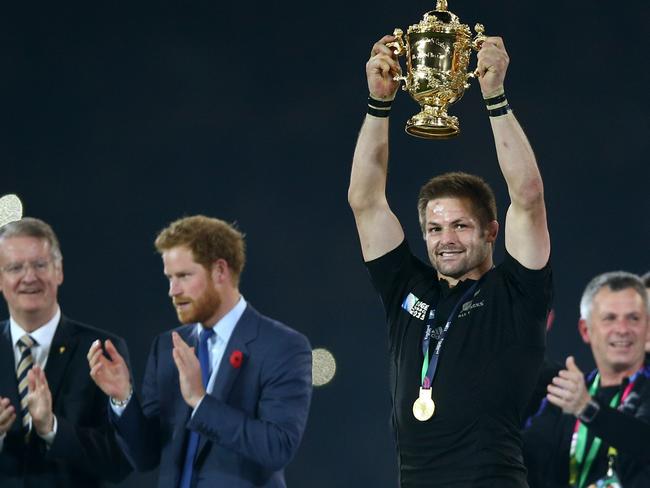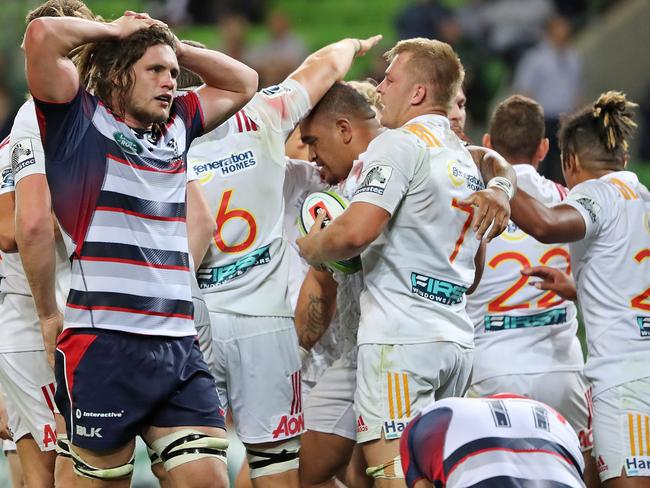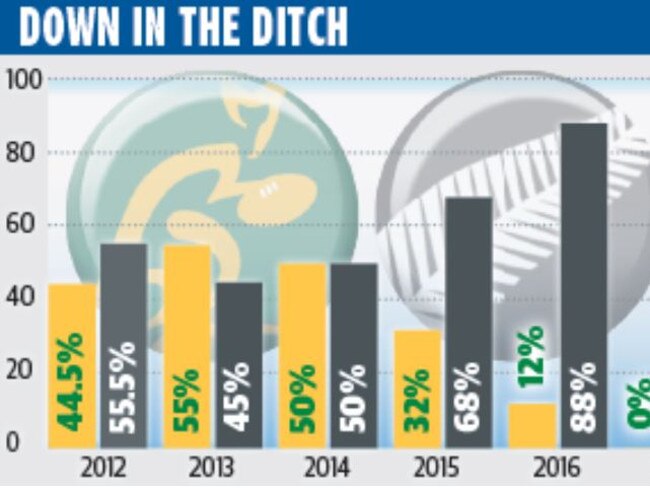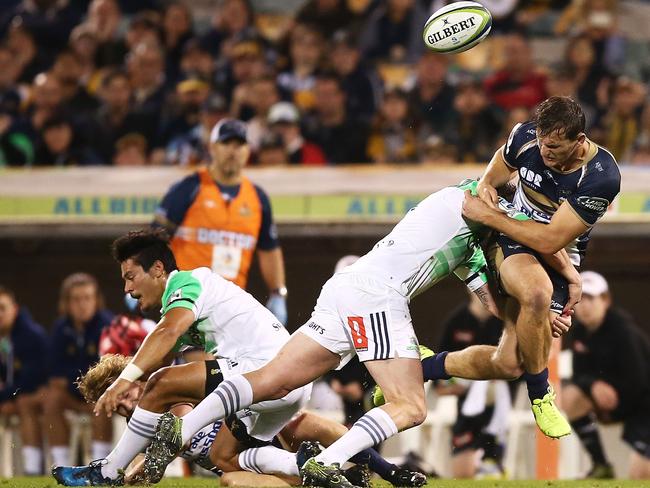Down in the Ditch: why can’t Australian teams beat Kiwis in Super Rugby anymore?
THERE was once a time when Australian teams could match New Zealand teams in Super Rugby. Now they couldn’t beat a Kiwi egg, so what on earth happened?
THERE used to be a time when Australian teams beat New Zealanders in rugby.
Okay, so kids born after the Wallabies’ last Bledisloe Cup win are now almost old enough to drive cars but in Super Rugby, the ledger has been far more even.
From the first days of Super Rugby in 1996 through to the Waratahs’ maiden title win in 2014, Australian teams won a respectable 45% of all matches against New Zealand opponents.
Since then, however, the Aussie Super Rugby car has taken a nosedive off a cliff.

The success rate of Australian teams against their Kiwi rivals dropped to 32% in 2015, and then 12% last year. After five rounds this year, it sat firmly on 0% — seven losses from seven games.
Since the start of the 2015 season, Australian teams have won just 10 games from 55 trans-Tasman clashes in Super Rugby. Ten.
So what on earth has happened? Why can’t Australian teams beat Kiwis anymore?
Wallabies legend Tim Horan says while Australian form has slipped, it is clear that New Zealand teams took the game to a new level in 2015 and no-one has followed.
Though skewed by the ludicrous new Super Rugby conference system, that theory is supported by the fact African teams only have 12 wins from 48 games in the same period.
“Leading up the 2015 World Cup I noticed all the New Zealand teams, and the All Blacks themselves, had gone up a level in their skills: the catch-pass, the offloads and just also how dynamic they are,” Horan said.
“It’s simple but they do it really well. I thought they’re taking this to another level but after a World Cup, everyone will see it and catch up. But they were so far ahead in that skill level and they kept advancing. No has got close.”

The overall record is emphatic but the trans-Tasman games aren’t as one-sided.
This year for example, the Crusaders only just scraped home against the Brumbies and the Reds, the Rebels almost beat the Chiefs and the Highlanders only won narrowly in Canberra.
“We are often only seven or eight minutes away. That last stretch in a match against a Kiwi team, that’s so often where we are getting beaten,” Horan says.
“But within New Zealand teams, they have so much belief in the guy next to them and the system, they know how to play at all moments. They have clarity and they have confidence.”
Mick Byrne is a man who knows the insides of New Zealand rugby better than most. Now the ARU head skills coach, Byrne filled the same role for the All Blacks and the NZRU between 2006 and 2015; during which time they won two World Cups.
Byrne said the reason why New Zealand win all the little moments is seen best with a big picture view.

“Take one areas, let’s say S & C,” Byrne said.
“In New Zealand the NZRU appoint the S & C coaches for all the teams. There is a head guy in New Zealand rugby called Mike Anthony and he sits at the top of that, and he also has age-grade development under him.
“But the All Blacks S & C coach Nick Jewell, and Mike Anthony, get on the same page at the start of the year and they work the research, what’s going to work and what’s not, and they put that out there to all the teams. And there is a consistent approach.
“The same philosophy is it there and there it is being driven through all the teams.
“Everybody is working towards being the best they can be, and the best in the world.”
That collaborative approach is mirrored in skills, scrummaging, style of play, medical management and general rugby knowledge. All Black coaches visit franchises constantly, sharing ideas with their Super Rugby counterparts.
It is the reason why when one Kiwi star goes down, a no-name replacement comes in and has the same size, skill and confidence as the big name.

“Consistent messages give you confidence and greater security and things like that,” Byrne said.
Australia is not centralised like the NZRU, but under Cheika and Byrne, there is now far more collaboration among Australian Super franchises. They may not all be on the same page yet but they’re reading the same chapter.
The concern for former Wallaby Rod Kafer is that disenfranchised Australian rugby fans have put down the book. Kafer believes the malaise in Aussie Super Rugby results reflects the general loss of “purpose” around Australian rugby, and the sparsely filled stadiums.
“When we were at our best, we were a niche sport with innovative ideas around how we were going to play the game,” he said.
“We needed to be better in core areas — from administration to tactics — but we lost that. We tried to expand and we moved fundamentally away from our supporter base. The grassroots of rugby, we moved away from them, because we thought that was the path to go down. In hindsight, it was wrong and it had impacted everything in our game.
“We can talk about skills and all this other stuff, but it is really more a sense of purpose and it is a belief in rugby in country.
“How many core supporters, dyed-in-the-wool rugby people have become a bit disillusioned? Like in a game of rugby, when it goes against you, you struggle to find ways to bring it back.
“I think our way to bring it back is to really focus on our niche place in Australian sport and rebuild the niche we had that forced us to be innovative.
“We must focus on what’s going on right now in our sport, not ten years in the future.”
Byrne is a process-driven pragmatist, and if you want encouraging news, here it is: he’s optimistic about Australian rugby. Australian teams will turn the Kiwi record around, it’s just going to take hard work, open minds and time.
“There are a lot of green shoots, and you just have to persist. You water them, you develop them and you don’t stamp on them,” Byrne said.
“There are positives and there have always been positives. It’s just the results of the last couple of years haven’t produced what we’d like. The Waratahs-Rebels game produced a lot of green shoots in terms of what we saw in the game. There was some good intensity. And confidence plays a big part in it all.
“There is a lot of optimism around the game behind closed doors. But we have to see it starting to appear on the field so everybody feels it. It’ll come.”
Originally published as Down in the Ditch: why can’t Australian teams beat Kiwis in Super Rugby anymore?
